Is Schizophrenia a Spiritual Problem? No!
Schizophrenia is not a spiritual problem; it is a chronic mental health disorder characterized by distortions in thinking, perception, emotions, language, sense of self, and behavior.
Schizophrenia is understood in the medical community as a psychiatric condition that affects a person’s brain chemistry and function.
This condition is typically diagnosed based on a combination of reported experiences and observed behavior.
Symptoms are often managed with a combination of medications, such as antipsychotics, and various forms of psychotherapy.
Schizophrenia can involve a range of symptoms, including hallucinations, delusions, disorganized thinking, and impaired executive function.
While the exact causes of schizophrenia are not fully understood, research suggests a combination of genetic, brain chemistry, and environmental factors.
While some cultures or individuals may conceptualize mental health issues, including schizophrenia, in spiritual terms, the prevailing view in modern psychiatry is that schizophrenia is a medical condition requiring appropriate medical and psychological treatment rather than a spiritual crisis or possession.

Key Takeaway
Historical Perspectives on Schizophrenia and Spirituality

The historical perspectives on schizophrenia and spirituality reveal a complex and evolving understanding of the relationship between these two concepts.
Throughout history, various cultures have interpreted schizophrenia through spiritual and religious lenses.
In ancient times, symptoms of schizophrenia were often attributed to possession by evil spirits or seen as divine punishment.
As medical knowledge expanded, these spiritual explanations began to intertwine with emerging psychiatric understandings.
The 18th and 19th centuries saw a shift towards medicalizing mental illness, but spiritual beliefs continued to influence societal attitudes and treatment methods.
Even today, spiritual explanations for schizophrenia persist in some cultures, shaping individuals� experiences and impacting their access to care.
Understanding this historical context is essential for comprehending the contemporary intersection of schizophrenia and spirituality.
Cultural Beliefs and Spiritual Explanations

Cultural beliefs and spiritual explanations play a significant role in shaping the perceptions and experiences of individuals with schizophrenia.
The cultural stigma surrounding mental illness can impact how individuals with schizophrenia are perceived and treated within their communities.
Additionally, spiritual healing practices and beliefs may influence the treatment-seeking behaviors and coping strategies of individuals with schizophrenia.
Understanding the interplay between cultural beliefs, spiritual explanations, and schizophrenia is crucial for providing comprehensive and culturally sensitive care for affected individuals.
Cultural Stigma and Schizophrenia
In many cultures, there exists a persistent stigma surrounding schizophrenia, often rooted in spiritual beliefs and explanations.
Cultural stigma towards individuals with schizophrenia can lead to social exclusion, discrimination, and hindered access to mental health services.
Cultural beliefs about the causes of schizophrenia, such as possession by evil spirits or punishment for past sins, contribute to this stigma.
These beliefs may result in affected individuals being ostracized or subjected to harmful traditional practices.
Furthermore, spiritual explanations can deter individuals from seeking medical treatment, perpetuating the stigma and potentially worsening the prognosis.
Understanding and addressing cultural stigma and its spiritual underpinnings is crucial for promoting acceptance, access to care, and better outcomes for those affected by schizophrenia across diverse cultural contexts.
Spiritual Healing Practices

Understanding the prevalence of spiritual healing practices in diverse cultural contexts is essential for comprehending the impact of cultural beliefs and spiritual explanations on individuals with schizophrenia.
In many cultures, spiritual healing practices play a significant role in addressing mental health issues, including schizophrenia.
These practices may involve rituals, ceremonies, prayer, or seeking guidance from spiritual leaders.
Cultural beliefs and spiritual explanations often shape the way individuals perceive and interpret schizophrenia.
For instance, in some cultures, schizophrenia symptoms may be attributed to spiritual possession or divine punishment.
Understanding these cultural nuances is crucial in providing effective and respectful care for individuals with schizophrenia. It also highlights the importance of integrating cultural competence into mental health treatments.
Impact on Treatment
The impact of cultural beliefs and spiritual explanations on the treatment of schizophrenia has been a subject of increasing attention and consideration in the field of mental health.
Cultural and spiritual beliefs can significantly influence the perception of schizophrenia and its treatment.
Here is a table outlining some cultural and spiritual factors that may impact the treatment of schizophrenia:
| Cultural/Spiritual Factor | Impact on Treatment |
|---|---|
| Stigma | May hinder seeking treatment |
| Family dynamics | Influence on treatment adherence |
| Traditional healing practices | Complement or conflict with medical treatment |
| Beliefs about the causes of schizophrenia | Influence treatment acceptance |
Understanding these factors is crucial for providing holistic and effective care for individuals with schizophrenia.
Neurobiological Understanding VS Spiritual Interpretations

Neurobiological research and spiritual interpretations present divergent perspectives on the nature of schizophrenia.
Neurobiological studies focus on understanding the biological basis of schizophrenia, such as genetic, neurodevelopmental, and neurochemical factors.
These studies have led to significant advancements in the development of antipsychotic medications and other treatments that target specific brain mechanisms.
On the other hand, spiritual interpretations often emphasize the existential and metaphysical aspects of schizophrenia, attributing its cause to spiritual or supernatural phenomena.
While neurobiological research provides empirical evidence and measurable outcomes, spiritual interpretations rely on faith, personal experiences, and cultural beliefs.
Integrating these divergent perspectives can be challenging, but it is essential for a comprehensive understanding of schizophrenia, allowing for holistic approaches that address both the biological and existential aspects of this complex condition.
Impact of Spirituality on Coping and Recovery

Spiritual interpretations of schizophrenia and their impact on coping and recovery will be explored about the existential and metaphysical aspects of the condition.
Research suggests that spirituality can play a significant role in the coping and recovery processes of individuals with schizophrenia.
For some, spiritual beliefs and practices provide a source of meaning, hope, and comfort, contributing to improved coping strategies and overall well-being.
Furthermore, spirituality has been linked to enhanced resilience and a sense of purpose, which are crucial factors in the recovery journey.
However, it is important to note that the impact of spirituality on coping and recovery can vary among individuals, and it should be integrated into comprehensive, multidimensional treatment approaches.
Understanding the role of spirituality in coping and recovery is essential for providing holistic support to individuals with schizophrenia.
Ethical Considerations in Addressing Spiritual Needs

When addressing the spiritual needs of individuals with schizophrenia, it is essential to uphold ethical considerations.
This involves respecting cultural beliefs to ensure that care is tailored sensitively to the individual�s cultural and spiritual background.
Additionally, it is crucial to address diverse perspectives on spirituality to provide comprehensive and inclusive support.
Respect Cultural Beliefs
Respecting cultural beliefs is essential in addressing the spiritual needs of individuals with schizophrenia.
Cultural competence in mental health care acknowledges the influence of culture on an individual�s perception of illness, treatment-seeking behavior, and coping strategies.
When working with individuals with schizophrenia, it is crucial to consider their cultural background and beliefs to provide effective and respectful support.
Tailor Care Sensitively

To effectively address the ethical considerations in tailoring care sensitively for individuals with schizophrenia, it is imperative to acknowledge and respect the diverse spiritual needs and beliefs that may influence their treatment and recovery.
Tailoring care to encompass spiritual beliefs involves recognizing the significance of spirituality in the lives of individuals with schizophrenia. It requires an understanding of how these beliefs may impact their coping mechanisms, perceptions of illness, and treatment adherence.
Ethical considerations encompass ensuring that any spiritual interventions are culturally sensitive, voluntary, and respectful of the individual�s autonomy.
Additionally, healthcare providers must recognize the potential influence of spiritual beliefs on treatment decisions and collaborate with the individual, their families, and spiritual leaders to integrate these beliefs into the care plan.
By acknowledging and respecting diverse spiritual needs, healthcare providers can ensure a more holistic and patient-centered approach to addressing schizophrenia.
Address Diverse Perspectives
The ethical considerations in addressing spiritual needs for individuals with schizophrenia encompass respecting diverse perspectives and ensuring culturally sensitive, voluntary, and respectful spiritual interventions.
It is imperative to acknowledge the diverse cultural and religious beliefs held by individuals with schizophrenia, as these beliefs may significantly influence their spiritual needs.
Mental health professionals should approach spiritual interventions with cultural humility, recognizing the importance of understanding and respecting the unique spiritual perspectives of each individual.
Furthermore, interventions should be voluntary, allowing individuals with schizophrenia to make their own choices regarding spiritual care. Respectful and non-coercive approaches are essential to uphold the ethical principle of autonomy.
By addressing diverse perspectives in a culturally sensitive and respectful manner, mental health professionals can navigate the ethical considerations involved in meeting the spiritual needs of individuals with schizophrenia.
Integrating Spiritual Support in Schizophrenia Treatment

Integrating spiritual support into schizophrenia treatment is an important aspect of holistic care for individuals with this mental health condition.
Spirituality can provide a sense of meaning, purpose, and connection for those struggling with schizophrenia. It can complement medical and psychological interventions, contributing to overall well-being.
However, it�s essential to approach spiritual support with sensitivity, respect for diverse beliefs, and in collaboration with mental health professionals.
The following table outlines potential ways to integrate spiritual support in schizophrenia treatment:
| Spiritual Support in Schizophrenia Treatment | Description |
|---|---|
| 1. Mindfulness and Meditation | Techniques to improve self-awareness and reduce stress. |
| 2. Pastoral Counseling | Counseling from religious leaders trained in mental health support. |
| 3. Support Groups | Faith-based or spiritually focused groups for peer support. |
| 4. Incorporating Personal Beliefs | Tailoring treatment to align with the individual�s spiritual beliefs. |
Conclusion
The intersection of schizophrenia and spirituality is a complex and multifaceted issue that has been approached from historical, cultural, neurobiological, and ethical perspectives.
While some may view schizophrenia as a spiritual problem, it is important to consider the impact of cultural beliefs and the potential benefits of integrating spiritual support into schizophrenia treatment.
By addressing the spiritual needs of individuals with schizophrenia, we can work towards a more holistic and compassionate approach to their coping and recovery journey.






